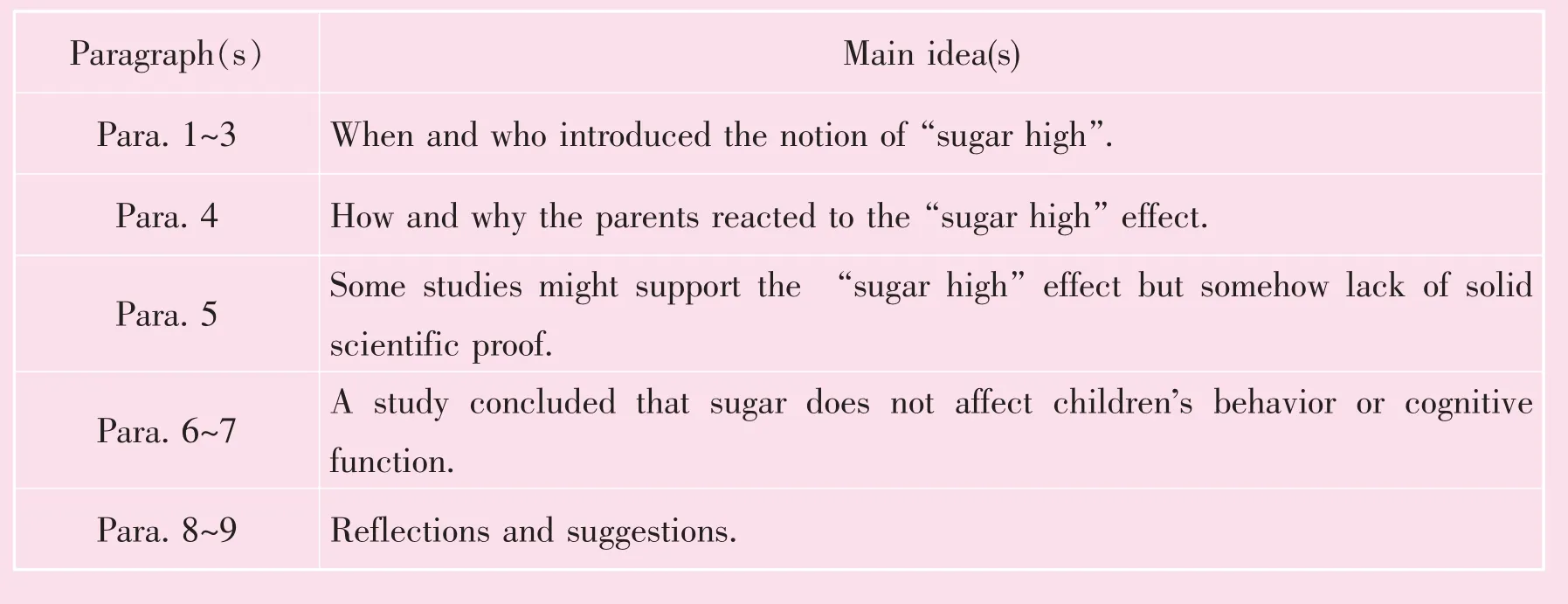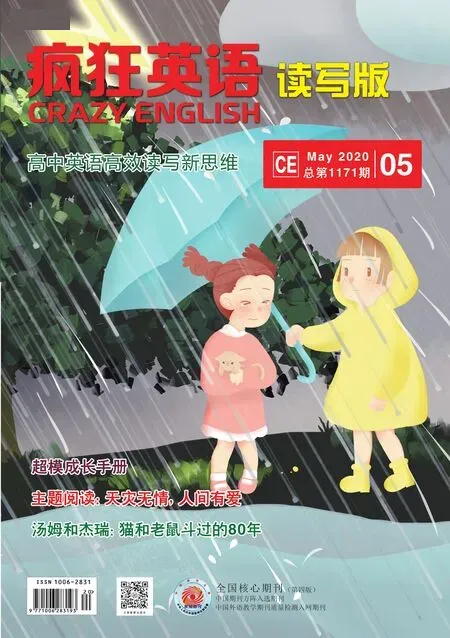Is there such a thing as a“sugar high”?
許多父母把孩子的過度活躍行為歸咎于糖分的過多攝入,不過這個觀點已經被證實是無根據(jù)的了。
難詞探意
1.hyperactive/?ha?p?r??kt?v/adj.(尤指兒童及其行為)極度活躍的
2.putative/?pju?t?t?v/adj.推定的;認定的
3.fair-haired/fe?(r)he?d/adj.金發(fā)的
4.wiry/?wa?r?ri/adj.金屬線制的;堅硬的;瘦長結實的
5.stimulant/?st?mj?l?nt/n.興奮劑
6.insulin/??nsj?l?n/n.胰島素
7.secretion/s??kri??n/n.分泌;分泌物
8.urine/?j??r?n/n.尿液
9.cognitive/?k?gn?t?v/adj.認知的;認識的
10.refute/r??fju?t/v.反駁
11.diabetes/?da???bi?ti?z/n.糖尿病
原文復現(xiàn)
The notion that sugar might make children behave badly first appeared in the medical literature in 1922.But the idea did not capture the public's imagination until Dr.Ben Feingold's best-selling book,Why Your Child IsHyperactive,was published in 1975.
In his book,Dr.Feingold describes the case of a boy who might well be “patient zero”for theputativeconnection between sugar and hyperactivity.
Thefair-haired,wiryson loved soft drinks,candy,and cake—not exactly abnormal for any healthy child.He also seemed to go completely wild after birthday parties and during family gatherings around holidays.
In the mid-70s,stimulantdrugs such as Ritalin and amphetamine were becoming popular for the treatment of attention deficit hyperactivity disorder.For parents who were concerned about drug side effects,the possibility of controlling hyperactivity by eliminating sugar proved to be an irresistible prospect.
①Some studies supported the theory.②They suggested that high sugar diets caused spikes ininsulin secretion,which caused adrenaline production and hyperactivity.③But the data were weakand were soon questioned by other scientists.
An extraordinary study settled the question in 1994.Writing in the New England Journal of Medicine,a group of scientists tested normal preschoolers and children whose parents described them as being sensitive to sugar.Neither the parents,the children nor the research staff knew which of the children were getting sugary foods and which were getting a diet sweetened with aspartame and other artificial sweeteners.Urinewas tested to prove compliance with the diets.Nine different measures ofcognitiveand behavioral performance were assessed,with measurements taken at fivesecond intervals.
The study concluded that sugar does not affect children's behavior or cognitive function.An editorial that accompanied the study put a fine point on that conclusion,stating “There is no evidence that sugar alone can turn a child with normal attention into a hyperactive child.”O(jiān)ne year later,an analysis that gathered data from all published studies on the subject reached the same conclusion.
While thoroughlyrefuted,the theory of the sugar high endures as a topic of ongoing investigation.But the results of these investigations continue to show that sugar does not affect children's behavior.
Still,limiting your child's sugar consumption is a good idea.Though cutting down on sugar will not affect children's behavior,it may help to protect them against obesity,type 2diabetes,and heart disease.
文本探究
Part 1 整體感知
本文是一篇簡潔明了的介紹性說明文。文章從大家比較熟知的“高糖效應”開始,通過講述其來源、“零號病人”以及父母對此的反應,讓讀者對“高糖效應”有了一個全面的了解;接著著重描述了這個效應的局限,通過列舉多項研究,證明“僅靠糖分就能使注意力正常的兒童變成多動癥兒童”是沒有科學依據(jù)的。

Paragraph(s) Main idea(s)Para.1~3 When and who introduced the notion of“sugar high”.Para.4 How and why the parents reacted to the“sugar high”effect.Para.5 Some studies might support the “sugar high”effect but somehow lack of solid scientific proof.Para.6~7 A study concluded that sugar does not affect children's behavior or cognitive function.Para.8~9 Reflections and suggestions.
典型段落段內結構分析:
Para.5

句子序號 句義概括 句間關系① Some studies supported the theory. 提出主要觀點,引出下文② Opinions of the studies. 總結研究得出的觀點③ The data were weak and lacked evidence. 進行反駁,并引出下文段意概括:雖然有研究說明糖分對興奮行為有刺激作用,但是卻缺乏充足的證據(jù)
Part 2 語言學習
難句分析
1.But the data were weak and were soon questioned by other scientists.
這里的data在科技英語中用作復數(shù)名詞,其單數(shù)形式是datum,所以后面接的是were;其次這里的and引導并列句,所以后面省略了同一個主語“data”。
2.Neither the parents,the children nor the research staff knew which of the children were getting sugary foods and which were getting a diet sweetened with aspartame and other artificial sweeteners.
在這個句子中,主語是parents,children 和research staff,(只是用了否定的形式);謂語就是knew;賓語是兩個并列的從句,即那些吃糖的兒童和吃人工增甜劑的兒童。
Part 3 視角拓展
“高糖效應”的思考
很多人可能都聽過 “高糖效應”(sugar high),意思是說吃甜食后的孩子,因為血糖飆升,會開始大聲叫嚷、動手動腳以及變得異常興奮。因為口耳相傳,讓很多家長認為,只要是甜的東西都是不好的,包括餅干、糖醋料理、甚至是超甜的水果等。其實,大家可能都搞錯對象了,讓孩子異常興奮的元兇可能不是糖分,而是那些食品添加劑。
1973年美國兒科醫(yī)生Benjamin Feingold的研究發(fā)現(xiàn),吃含有水楊酸、人工色素與人工香精的食物,會讓兒童產生多動的癥狀。但因為當時Benjamin Feingold把糖也歸為了人工添加物,所以經過媒體的宣傳,大家就開始認為,孩子們的多動癥是糖分惹的禍。
而在1994 年, 美國范德堡大學的Mark Wolraich做了一項很有意思的研究:他找了一群聲稱“吃糖就會抓狂”的兒童,把他們分成3組,一組吃純糖,另外兩組吃阿斯巴甜等“假糖”,然后去觀察他們的多動癥情況。實驗的結果顯示, 吃真糖與吃假糖的兒童行為沒有差別,也就是說,孩子們吃甜食并不是造成他們多動的原因。
而根據(jù)最新的研究,一篇發(fā)表在著名醫(yī)學雜志《柳葉刀》的文章顯示,針對平常沒有多動癥的3~9歲兒童,實驗證實了含有食用色素或苯甲酸鈉防腐劑的食品和飲料,都會加大孩子患多動癥的概率。因此,食品添加劑,包括食用色素和防腐劑,才是誘發(fā)多動癥的原因。
貼心建議:對小孩子來說,盡量讓他們少吃零食和飲料。雖然多動癥的發(fā)生不是單一因素造成的,背后也有很多其他因素,包括遺傳、環(huán)境、心理發(fā)展等,但這至少是一個明確可控的因素。

